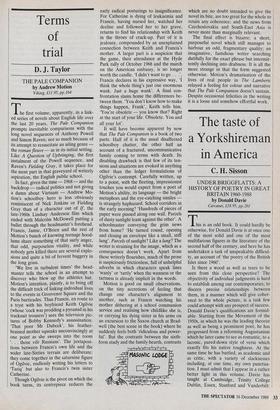Terms of trial
D. J. Taylor
THE PALE COMPANION by Andrew Motion
Viking, L11.95, pp.164
The first volume, apparently, in a link- ed series of novels about English life over the last 20 years, The Pale Companion prompts inevitable comparisons with the long novel sequences of Anthony Powell and Simon Raven; not so much because of its attempt to resuscitate an ailing genre the roman fleuve — as in its initial setting. Like A Question of Upbringing, the first instalment of the Powell sequence, and Raven's Fielding Gray, it takes place for the most part in that graveyard of writerly aspiration, the English public school. In fact, given the time — 1968 — and the backdrop — radical politics and not giving a damn about Vietnam — Andrew Mo- tion's schoolboy hero is less obviously reminiscent of Nick Jenkins or Fielding Gray than of a character out of If, the late-1960s Lindsay Anderson film which ended with Malcolm McDowell putting a bullet through the headmaster's forehead. Francis, Jamie, O'Brien and the rest of Motion's bunch of knowing teenage hood- lums share something of that surly anger, that odd, purposeless vitality, and while nobody gets killed there are several explo- sions and quite a bit of fervent buggery in the long grass. `We live in turbulent times' the head- master tells the school in an attempt to discover who blew up the athletics hut. Motion's intention, plainly, is to bring off the difficult trick of linking individual lives to the events in Grosvenor Square and the Paris barricades. Thus Francis, en route to a tryst with his boyfriend Keith Ogilvie (whose 'cock was prodding a pyramid in his tracksuit trousers') sees the television pic- tures of Bobby Kennedy's assassination. `That poor Mr Dubcek', his feather- brained mother squeaks unconvincingly at one point as she sweeps into the room ‘. . . those vile Russians'. The juxtaposi- tions between Francis's own life and the wider late-Sixties terrain are deliberate: they come together in the saturnine figure of Ogilvie, endlessly writing his letters to `Tariq' but also to Francis's twin sister Catherine.
Though Ogilvie is the pivot on which the book turns, its centrepiece reduces the
early radical posturings to insignificance. For Catherine is dying of leukaemia and Francis, having nursed her, watched her decline and followed her to her grave, returns to find his relationship with Keith in the throes of crack-up. Part of it is jealousy, compounded by an unexplained connection between Keith and Francis's mother. A larger part is a suspicion that the game, their attendance at the Hyde Park rally of October 1968 and the march on the American embassy, is no longer worth the candle. 'I didn't want to go . . Francis declares in his expressive way, 'I think the whole thing's just one enormous wank. Just a huge wank'. A final con- frontation slams home the differences be- tween them. 'You don't know how to make things happen, Frank', Keith tells him. `You're obsolete — you know that? Right at the start of your life. Obsolete. You and all your lot'.
It will have become apparent by now that The Pale Companion is a book of two parts. Half of it is the usual disaffected schoolboy chatter, the other half an account of a fractured, uncommunicative family coming to terms with death. Its disabling drawback is that few of its ten- sions and situations are evoked in anything other than the ledger formulations of Ogilvie's contempt. Carefully written, up to a point, with the fleeting, impressionist touches you would expect from a poet of Motion's ability, its language — the bright metaphors and the eye-catching similes is strangely haphazard. School corridors in the early morning? 'Hundreds of pieces of paper were pinned along one wall. Parcels of dusty sunlight leant against the other'. A schoolmaster conveying the grim news from home? 'He turned round, opening and closing an envelope like a small, stiff lung'. Parcels of sunlight? Like a lung? The writer is straining for the image, which as a consequence doesn't work. Apart from these writerly flourishes, much, of the prose is suspiciously frictionless, full of unhelpful adverbs in which characters speak lines `wanly' or 'tartly' when the wanness or the tartness is already implicit in the words.
Motion is good on small observations, on the tiny accretions of feeling that change one character's alignment to another, such as Francis watching his mother dithering at a school communion service and realising how childlike she is, or carrying his dying sister in his arms on an excursion to the Saxon church at Brad- well (the best scene in the book) where he suddenly feels both 'ridiculous and power- ful'. But the contrasts between the sixth- form study and the family hearth, contrasts which are no doubt intended to give the novel its bite, are too great for the whole to retain any coherence: and the news from Czechoslovakia and South-East Asia is never more than marginally relevant.
The final effect is bizarre: a short, purposeful novel which still manages to harbour an odd, fragmentary quality; an imaginative, fastidious writer searching dutifully for the exact phrase but intermit- tently declining into drabness. It is all the more strange in that the form suggested otherwise. Motion's dramatisation of the lives of real people in The Lamberts relayed a feeling for colour and narrative that The Pale Companion doesn't sustain. Despite occasional felicities in the writing it is a loose and somehow effortful work.


















































 Previous page
Previous page